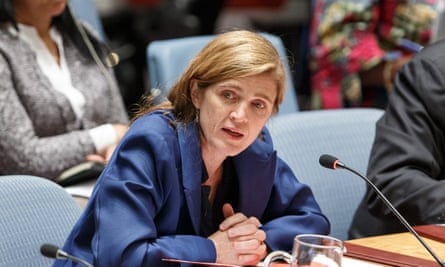International diplomacy can take unexpected twists, taking in pandas and ping-pong. Now Samantha Power, the US ambassador to the UN, has added Broadway musicals to the diplomatic toolkit.
This week Power invited 17 UN ambassadors to the Tony award-winning musical Fun Home, the main character of which is a lesbian whose father is gay. Based on the autobiographical graphic novel by Alison Bechdel, Fun Home is about growing up in a family-owned funeral home in a small Pennsylvania town where the daughter is attracted to women and the father secretly has affairs with men.
A notable invitee was Russia’s envoy, whose country has made it a crime to hold gay rights rallies or to openly discuss homosexuality in content accessible to children. Ambassadors from Australia, Namibia, Norway, Mexico, Uruguay and Vietnam, which legalised same-sex marriage last year, were also on the guest list. Several ambassadors said after the play that they had gone without knowing what the musical was about.
Power said she invited a diverse group of ambassadors to see the stories of real lives to bring home “the challenges that LGBT [lesbian, gay, bisexual and transgender] people face every day around the world”.
The play dramatises the LGBT issue “in a way that [UN] resolutions and statements never can. This is the way we are going to break through,” she said. “It’s about imagining oneself. It’s about imagining one’s child. It’s about imagining one’s father.”
But Power, a former journalist and author of several books, stressed that “it takes time to change the DNA of the UN, just as it’s taken a lot of time to change the DNA of the United States”.

Afterwards, the actor Cynthia Nixon, a star of the TV series Sex and the City, moderated a discussion with the writers and cast, which was followed by comments from several ambassadors.
“Too often our work is about abstracts,” Switzerland’s ambassador, Jürg Lauber, said. “Once in a while it’s important to tell us it’s about people.”
João Vale de Almeida, the EU’s ambassador to the UN and a Portuguese citizen, said his younger brother told him he was gay on a long car journey – similar to a scene in the play – and they thought up the best way to tell their parents.
“It could have gone wrong but [it] went pretty well,” he said. “It’s a good story in my case. I know [for] other people, the stories were not so good.”
Vale de Almeida said the performance was “great” and told the cast: “It’s crucial that you shared [the story] with everybody.”
Power’s diplomatic gambit on Tuesday evening reflects a drive by the Obama administration to promote LGBT rights internationally. In 2011, Hillary Clinton, then secretary of state, went to the UN in Geneva and proclaimed LGBT rights as “one of the remaining human rights challenges of our time”.
Since then, US embassies have been opening their doors to gay rights activists, hosting events and supporting local advocacy work. The US has six openly gay ambassadors, in Vietnam, Australia, Denmark, Spain, the Dominican Republic and the Organisation for Security and Cooperation in Europe.
Last year in a visit to Kenya, where consenting adults can face up to 14 years in prison for having same-sex relations, Obama confronted Kenya’s president, Uhuru Kenyatta, and millions of Kenyans watching on television on the issue of gay rights.
“I’ve been consistent all across Africa on this,” he said, during a joint press conference at the state house in Nairobi. “When you start treating people differently, because they’re different, that’s the path whereby freedoms begin to erode. And bad things happen.”
